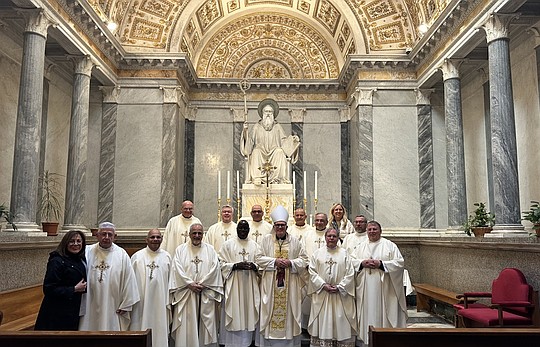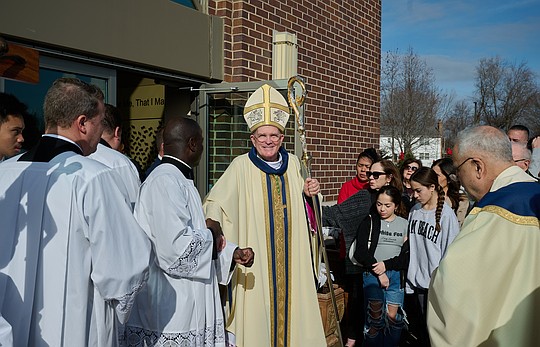Father Koch: How do we love one another in the age of social media?
February 16, 2023 at 2:06 a.m.

Jesus continues his commentary on the Mosaic Law, and the expansion of what observance of the Law means, as we pick-up our Reading of the Sermon on the Mount.
The purpose of law at its core is to govern the interactions between people and of people within a society, in order to exact justice. Each person stands individually before the law and is treated as equal within and by the law. While we can debate the execution in enforcement and practice, the Law itself envisions equality.
The challenge before any individual Christian is coming to an understanding of justice. The ancient laws, including the Laws of Moses, attempted to define a sense of justice as an equality of outcomes. If you damaged my leg, then I had the right to equally damage your leg. This was an attempt to curb extremes in the treatment of a crime. I can do no more to you than you did to me. Even though such reprisal laws have not been in force for thousands of years, we are still inclined to seek justice in these basic ways. There is a sense of justice ingrained in our culture, which feels more like vengeance than it does true justice.
Jesus’s sense of justice is not merely reactive, it is proactive. If you seek justice, then you must act first with justice. This places a higher demand on his disciples. It is easy to act justly in situations where one is being treated with a sense of justice. It is much harder to be just in the face of injustice. A proactive approach allays fears and reduces the situations in which a response in justice -- or more likely a sense of vengeance -- might result.
The ultimate form of justice is to act with love. Nothing is more disarming than love in the face of hatred, injustice, or cruelty.
Unfortunately, even after 2,000 years of proclaiming the Gospel, love is still not our first response or immediate reaction in any given situation. Our knee jerk response is to become defensive, defiant, and demanding of an apology or some recognition of the offense or slight we feel.
Our response to the needs of others is borne from skepticism and a sense of judgment, instead of compassion and love.
The Gospel calls us to something greater. We saw a glimpse of this in some of the ads during the Super Bowl last weekend. Although trivializing the Gospel, the message was clear -- in the face of the hostility of the world, the Christian is called to a merciful and just response.
Too much of the rhetoric in political and social issues forums are grounded in distortion of the Gospel message. The arguments, responses, and accusations from all sides of the political spectrum ultimately make a mockery of the teaching of Jesus.
Jesus preached love and justice, yes; but Jesus preached a tough love and expansive justice. It’s not an :eye for an eye” but a turn of the cheek.
If acting with justice fueled by love was not hard enough, contemporary society has made it even more challenging. In contrast, acting with vengeance is a part of our sinful human condition, and anonymity in social media has served to stoke those flames. It is easy to condemn, criticize, and even outright libel someone on social media. Vengeance is the total antithesis of love and compassion, and contrary to the Gospel.
The effects of what we know call “shaming” and schoolyard bullying have been elevated to new lows, bringing out the worst in all of us. The death of an Ocean County teenager a few weeks ago reminds us of the horror and consequence of the sin against love and justice. It is the extreme – but not rare – response to a world which treats us all as commodities, where we are judged by our weakness, social standing, finances, appearance, orientation and our habits.
In the face of abuse and cruelty the possibility of “turn the other cheek” becomes less and less tenable. Hence, we fail on both sides – we continue to act with no regard for love or justice – and we react in ways that are equally unloving and unjust.
As Lent begins this coming week, we are challenged by this teaching of Jesus to deeply reflect on how we interact with others, and whether or not we are at the service of love and mercy, or vengeance and hatred. It is a very difficult question to confront.
Father Garry Koch is pastor of St. Benedict Parish, Holmdel.
Related Stories
Saturday, January 03, 2026
E-Editions
Events
Jesus continues his commentary on the Mosaic Law, and the expansion of what observance of the Law means, as we pick-up our Reading of the Sermon on the Mount.
The purpose of law at its core is to govern the interactions between people and of people within a society, in order to exact justice. Each person stands individually before the law and is treated as equal within and by the law. While we can debate the execution in enforcement and practice, the Law itself envisions equality.
The challenge before any individual Christian is coming to an understanding of justice. The ancient laws, including the Laws of Moses, attempted to define a sense of justice as an equality of outcomes. If you damaged my leg, then I had the right to equally damage your leg. This was an attempt to curb extremes in the treatment of a crime. I can do no more to you than you did to me. Even though such reprisal laws have not been in force for thousands of years, we are still inclined to seek justice in these basic ways. There is a sense of justice ingrained in our culture, which feels more like vengeance than it does true justice.
Jesus’s sense of justice is not merely reactive, it is proactive. If you seek justice, then you must act first with justice. This places a higher demand on his disciples. It is easy to act justly in situations where one is being treated with a sense of justice. It is much harder to be just in the face of injustice. A proactive approach allays fears and reduces the situations in which a response in justice -- or more likely a sense of vengeance -- might result.
The ultimate form of justice is to act with love. Nothing is more disarming than love in the face of hatred, injustice, or cruelty.
Unfortunately, even after 2,000 years of proclaiming the Gospel, love is still not our first response or immediate reaction in any given situation. Our knee jerk response is to become defensive, defiant, and demanding of an apology or some recognition of the offense or slight we feel.
Our response to the needs of others is borne from skepticism and a sense of judgment, instead of compassion and love.
The Gospel calls us to something greater. We saw a glimpse of this in some of the ads during the Super Bowl last weekend. Although trivializing the Gospel, the message was clear -- in the face of the hostility of the world, the Christian is called to a merciful and just response.
Too much of the rhetoric in political and social issues forums are grounded in distortion of the Gospel message. The arguments, responses, and accusations from all sides of the political spectrum ultimately make a mockery of the teaching of Jesus.
Jesus preached love and justice, yes; but Jesus preached a tough love and expansive justice. It’s not an :eye for an eye” but a turn of the cheek.
If acting with justice fueled by love was not hard enough, contemporary society has made it even more challenging. In contrast, acting with vengeance is a part of our sinful human condition, and anonymity in social media has served to stoke those flames. It is easy to condemn, criticize, and even outright libel someone on social media. Vengeance is the total antithesis of love and compassion, and contrary to the Gospel.
The effects of what we know call “shaming” and schoolyard bullying have been elevated to new lows, bringing out the worst in all of us. The death of an Ocean County teenager a few weeks ago reminds us of the horror and consequence of the sin against love and justice. It is the extreme – but not rare – response to a world which treats us all as commodities, where we are judged by our weakness, social standing, finances, appearance, orientation and our habits.
In the face of abuse and cruelty the possibility of “turn the other cheek” becomes less and less tenable. Hence, we fail on both sides – we continue to act with no regard for love or justice – and we react in ways that are equally unloving and unjust.
As Lent begins this coming week, we are challenged by this teaching of Jesus to deeply reflect on how we interact with others, and whether or not we are at the service of love and mercy, or vengeance and hatred. It is a very difficult question to confront.
Father Garry Koch is pastor of St. Benedict Parish, Holmdel.










